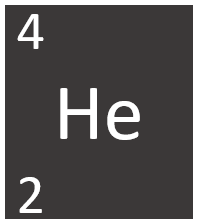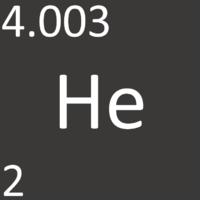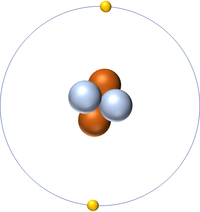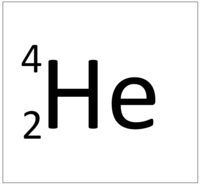Difference between revisions of "Helium"
| Line 4: | Line 4: | ||
==Key Stage 3== | ==Key Stage 3== | ||
[[File:HeliumSymbol1.png|right|300px|thumb|The [[Chemical Symbol|chemical symbol]] for [[Helium]].]] | [[File:HeliumSymbol1.png|right|300px|thumb|The [[Chemical Symbol|chemical symbol]] for [[Helium]].]] | ||
| − | [[File:Helium2d.png|right|200px|thumb|A 2 dimensional representation of a [[Helium]] [[atom]] with 2 [[proton]]s (red) and two [[neutron]]s (blue) in the [[Atomic Nucleus|nucleus]] and two [[electron]]s orbiting the [[Atomic Nucleus|nucleus]] (shown as | + | [[File:Helium2d.png|right|200px|thumb|A 2 dimensional representation of a [[Helium]] [[atom]] with 2 [[proton]]s (red) and two [[neutron]]s (blue) in the [[Atomic Nucleus|nucleus]] and two [[electron]]s orbiting the [[Atomic Nucleus|nucleus]] (shown as crosses).]] |
===Meaning=== | ===Meaning=== | ||
Revision as of 10:52, 12 March 2020
Contents
Key Stage 2
Meaning
Key Stage 3
Meaning
Helium is a Group 0 element, on the Periodic Table, with an atomic number of 2.
About Helium
- Helium has the chemical formula He.
- Helium has two protons and two neutrons in its nucleus giving it an Atomic Number of 2 and an atomic mass of 4.
- Helium is a Noble Gas.
- Helium is a gas at room temperature.
- Helium gas is less dense than air.
- An atom of Helium has a full outer shell of two electrons so it is inert.
Key Stage 4
Meaning
Helium is a Group 0 element, on the Periodic Table, with 2 protons in the nucleus.
About Helium
- Helium has the chemical formula He.
- The most stable isotope of Helium has two neutrons in its nucleus giving it an atomic mass of 4.
- Helium is a Noble Gas.
- Helium is a gas at standard temperature and pressure.
- Helium gas is less dense than air.
- An atom of Helium has a full outer shell of two electrons so it is inert.
| Helium always has 2 protons. The most stable isotope has 2 neutrons. | |




